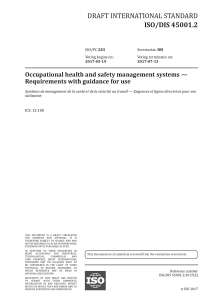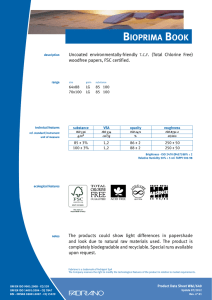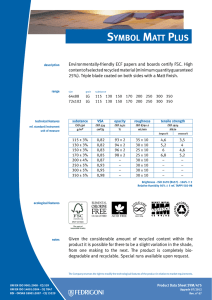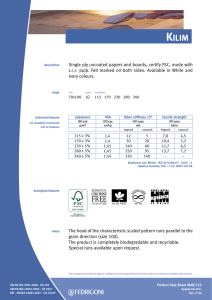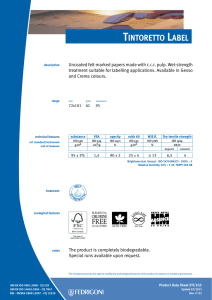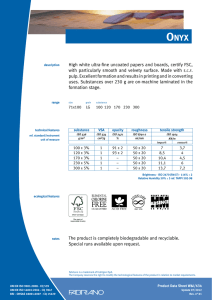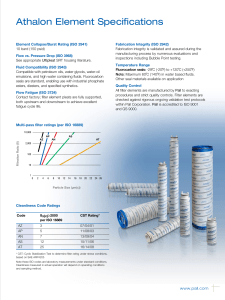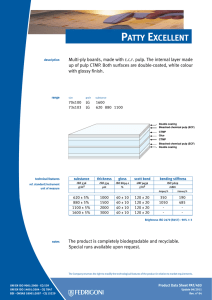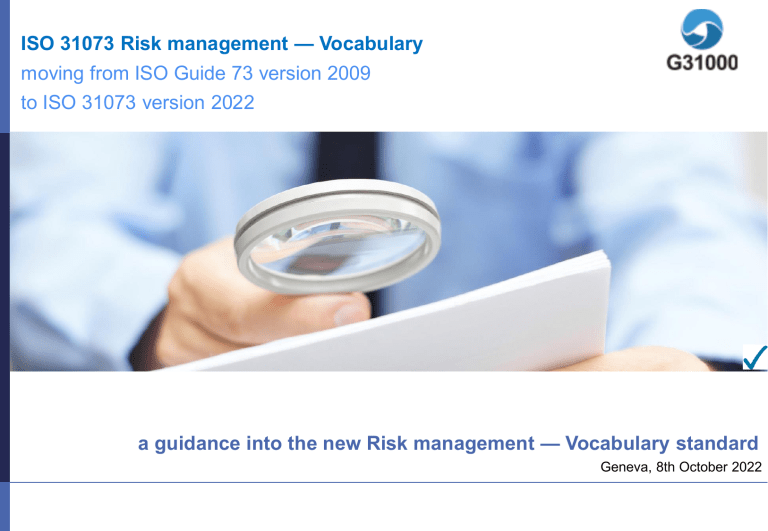
ISO 31073 Risk management — Vocabulary moving from ISO Guide 73 version 2009 to ISO 31073 version 2022 a guidance into the new Risk management — Vocabulary standard Geneva, 8th October 2022 Free access In collaboration with ISO, we are pleased to provide you a free ready-only access to ❑ the ISO 31073:2022 - Risk management — Vocabulary standard https://www.iso.org/obp/ui/#iso:std:iso:31073:ed-1:v1:en ❑ the ISO 3100:2018 - Risk management — standard https://www.iso.org/obp/ui#iso:std:iso:31000:ed-2:v1:en Disclaimer The designations employed and the presentation of the material in this publication do not imply the expression of any opinion whatsoever on the part of the Secretariat of the International Standardization Organization (ISO) or the permanent ISO member representative of the international committee ISO TC 262. This publication does not purport to include all the necessary provisions of a contract. Users are responsible for its correct understanding and application. Compliance with ISO Standards or their national version cannot confer immunity from legal obligations. G31000 - The Global Institute for Risk Management Standards Balexert Tower, Avenue Louis-Casai 18, 1209 Geneva, Switzerland Email : [email protected] Website: www.G31000.org 2 2/24 Introduction ISO Guide 73:2009 ISO 31073:2022 Purpose : basic vocabulary on risk management concepts Purpose : basic vocabulary on risk management concepts Risk management is application specific : use a language meaningful for your organization Risk management is application specific: use a language meaningful for your organization. The terminology in this document may need to be replaced by disciplinary-specific terminology where appropriate Moving from ISO Guide 73 version 2009 to ISO 31073 version 2022 - a guide into the new ISO standard - Risk management — Vocabulary 3/24 Introduction ISO Guide 73:2009 Broad application – any types of risks, in any application, industry or sectors Terms apply for managing threats & potential opportunities Scope : - mutual and consistent understanding ISO 31073:2022 Broad application - any types of risks, in any application, any industry or sectors Terms apply for managing threats & potential opportunities Benefits : move to benefits of vocabulary related to risk - uniform risk management terminology in processes and frameworks - same - coherent approach Moving from ISO Guide 73 version 2009 to ISO 31073 version 2022 - a guide into the new ISO standard - Risk management — Vocabulary 4/24 Introduction ISO Guide 73:2009 ➢ ➢ ➢ ▪ ▪ ▪ Users : those engaged in managing risks those using ISO standards developers of national or sectorspecific standards, guides, procedures and codes of practice related to the management of risk Structure : Terms related to risk Terms related to risk management Terms related to risk management process ISO 31073:2022 ➢ ➢ ➢ ➢ ➢ ➢ Users : those engaged in managing risks those using ISO standards developers of national or sectorspecific standards, guides, procedures and codes of practice related to the management of risk Structure : Terms related to risk Terms related to risk management Terms related to risk management process Moving from ISO Guide 73 version 2009 to ISO 31073 version 2022 - a guide into the new ISO standard - Risk management — Vocabulary 5/24 ISO 31073:2022 and ISO Guide 73:2009 • COMMUNICATION & CONSULTATION • CONSEQUENCE • CONTROL • ESTABLISHING THE CONTEXT • EVENT • EXPOSURE • EXTERNAL CONTEXT • FREQUENCY • HAZARD • INTERESTED PARTY • INTERNAL CONTEXT • LEVEL OF RISK • LIKELIHOOD • MONITORING • OBJECTIVE • OPPORTUNITY • ORGANIZATION • PROBABILITY • RESIDUAL RISK BLUE = NEW TERM ADDED • • • • • • • • • • • • • • • • • • • • RESILIENCE REVIEW RISK RISK ACCEPTANCE RISK AGGREGATION RISK ANALYSIS RISK APPETITE RISK ASSESSMENT RISK ATTITUDE RISK AVERSION RISK AVOIDANCE RISK CONTROL RISK CRITERIA RISK DESCRIPTION RISK DRIVER RISK EVALUATION RISK FINANCING RISK IDENTIFICATION RISK MANAGEMENT RISK MANAGEMENT AUDIT RED = TERM REMOVED • RISK MANAGEMENT FRAMEWORK • RISK MANAGEMENT PLAN • RISK MANAGEMENT POLICY • RISK MANAGEMENT PROCESS • RISK MATRIX • RISK OWNER • RISK PERCEPTION • RISK PROFILE • RISK REGISTER • RISK REPORTING • RISK RETENTION • RISK SHARING • RISK SOURCE • RISK TOLERANCE • RISK TREATMENT • THREAT • STAKEHOLDER • UNCERTAINTY • VULNERABILITY GRAY = TERM MAINTENED 6 6/24 General view about definitions ISO Guide 73:2009 ISO 31073:2022 51 terms defined ➢ 9 terms removed 49 terms defined ➢ 41 terms maintained ➢ 8 new terms added • • • • • • • • • COMMUNICATION & CONSULTATION CONTROL ESTABLISHING THE CONTEXT RISK DESCRIPTION RISK MANAGEMENT FRAMEWORK RISK MATRIX RISK PROFILE RISK REGISTER STAKEHOLDER ➢ 2 terms replaced • • CONTROL STAKEHOLDER • • • • • • • • INTERESTED PARTY OBJECTIVE OPPORTUNITY ORGANIZATION RISK CONTROL RISK DRIVER THREAT UNCERTAINTY ➢ 2 terms replaced • • RISK CONTROL INTERESTED PARTY Moving from ISO Guide 73 version 2009 to ISO 31073 version 2022 - a guide into the new ISO standard - Risk management — Vocabulary 7/24 TERMS RELATED TO RISK ISO 31073:2022 ISO Guide 73:2009 Risk = effect of uncertainty on objectives Uncertainty Risk = effect of uncertainty on objectives Uncertainty = state, even partial, of deficiency of information related to understanding or knowledge Explained in a note of the definition of risk in ISO 31000:2009, but removed in version 2018 Objective Objective = result to be achieved Not defined Moving from ISO Guide 73 version 2009 to ISO 31073 version 2022 - a guide into the new ISO standard - Risk management — Vocabulary 8/24 TERMS RELATED TO RISK MANAGEMENT ISO Guide 73:2009 risk management = coordinated activities to direct and control an organization with regard to risk risk management policy = statement of the overall intentions and direction of an organization related to risk management ISO 31073:2022 risk risk risk risk management management policy management plan management framework risk management plan = scheme within the risk management framework specifying the approach, the management components and resources to be applied to the management of risk Definition entirely removed risk management framework Moving from ISO Guide 73 version 2009 to ISO 31073 version 2022 - a guide into the new ISO standard - Risk management — Vocabulary 9/24 Terms modified 41 terms maintained, but 15 definitions have been modified • • • • • • • • • • • • • • CONSEQUENCE EVENT EXPOSURE EXTERNAL CONTEXT FREQUENCY HAZARD INTERNAL CONTEXT LEVEL OF RISK LIKELIHOOD MONITORING PROBABILITY RESIDUAL RISK RESILIENCE REVIEW • • • • • • • • • • • • • • RISK RISK ACCEPTANCE RISK AGGREGATION RISK ANALYSIS RISK APPETITE RISK ASSESSMENT RISK ATTITUDE RISK AVERSION RISK AVOIDANCE RISK CRITERIA RISK EVALUATION RISK FINANCING RISK IDENTIFICATION RISK MANAGEMENT RED = TERM MAINTENED WITH MODIFICATIONS • • • • • • • • • • • • • RISK MANAGEMENT AUDIT RISK MANAGEMENT PLAN RISK MANAGEMENT POLICY RISK MANAGEMENT PROCESS RISK OWNER RISK PERCEPTION RISK REPORTING RISK RETENTION RISK SHARING RISK SOURCE RISK TOLERANCE RISK TREATMENT VULNERABILITY GRAY = TERM MAINTENED WITHOUT MODIFICATIONS 10/24 Terms affected by changing “stakeholder” 9 terms affected by changing “stakeholder” by “interested parties” ISO Guide 73:2009 ISO 31073:2022 9 definitions affected • • • • • • • • • EXPOSURE EXTERNAL CONTEXT INTERNAL CONTEXT MONITORING REVIEW RISK IDENTIFICATION RISK PERCEPTION RISK REPORTING RISK TOLERANCE Indication mentioned about the change : ➢ “interested party” has replaced “stakeholder” - Moving from ISO Guide 73 version 2009 to ISO 31073 version 2022 - a guide into the new ISO standard - Risk management — Vocabulary 11/24 Terms modified Important modifications ISO Guide 73:2009 Important modifications ➢ risk sharing = form of risk treatment involving the agreed distribution of risk with other parties ➢ risk analysis = process to comprehend the nature of risk and to determine the level of risk ➢ risk evaluation = process of comparing the results of risk analysis with risk criteria to determine whether the risk and/or its magnitude is acceptable or tolerable ISO 31073:2022 Note 1 Much clearer Note 2 Note 3 Note 4 : Risk transfer is a form of risk sharing ➢ Note 1 ➢ Note 2 : risk analysis include risk estimation ➢ ➢ ➢ ➢ Much clearer Moving from ISO Guide 73 version 2009 to ISO 31073 version 2022 - a guide into the new ISO standard - Risk management — Vocabulary 12/24 Other terms modified Minor modifications ISO Guide 73:2009 Minor modifications ➢ “risk” has replaced “a risk” ❑ Risk owner = person or entity with the accountability and authority to manage a risk ❑ risk criteria = terms of reference against which the significance of a risk is evaluated Probability = measure of the chance of occurrence expressed as a number between 0 and 1, where 0 is impossibility and 1 is absolute certainty ISO 31073:2022 Important aspects to remember In practice, as soon as a risk is identified, a risk owner should be designated for a particular range (small, medium, large or catastrophic consequences) In practice, the significance of (a) risk should be replaced by “level of risk” in order to avoid confusion A number from 0 and 1 Moving from ISO Guide 73 version 2009 to ISO 31073 version 2022 - a guide into the new ISO standard - Risk management — Vocabulary 13/24 Terms removed Important modifications ISO Guide 73:2009 ➢ ➢ ➢ ➢ Important deletions risk matrix = tool for ranking and displaying risks by defining ranges for consequence and likelihood risk profile = description of any set of risks risk register = record of information about identified risks stakeholder= person or organization that can affect, be affected by, or perceive themselves to be affected by a decision or activity ISO 31073:2022 Risk Matrix is removed in order to align with ISO 31010:2019 – Risk management — Risk assessment techniques standard which prefer to use the term “Consequence likelihood matrix as technique number B.9.3. This definition is very academic. In practice, not useful This removal is unfortunate, as it is sometimes mandated by law and regulations. In ISO 31010:2019 standard, it is refered as techniques B.9.2. as it is useful in practice. Removing and replacing “stakeholder” by “interested party” is plainly wrong, as it is today widely accepted. Moving from ISO Guide 73 version 2009 to ISO 31073 version 2022 - a guide into the new ISO standard - Risk management — Vocabulary 14/24 New terms associated with the definition of risk Risk = the effect of uncertainty on objectives ISO 31000:2009 and ISO 31000:2018 NOTE 1 (ISO31000:2018): An effect is a deviation from the expected. It can be positive, negative or both. An effect can arise as a result of a response, or failure to respond, to an opportunity or to a threat related to objectives. NOTE 2 (ISO31000:2009) : Objectives can have different aspects (such as financial, health and safety, and environmental goals) and can apply at different levels (such as strategic, organization-wide, project, product and process). NOTE 2 (ISO31000:2018) : Objectives can have different aspects and categories and can be applied at different levels. ISO 31073:2022 Important additions • OBJECTIVE • UNCERTAINTY • OPPORTUNITY • THREAT NOTE 5 (ISO31000:2009) : Uncertainty is the state, even partial, of deficiency of information related to, understanding or knowledge of, an event, its consequence, or likelihood. Moving from ISO Guide 73 version 2009 to ISO 31073 version 2022 - a guide into the new ISO standard - Risk management — Vocabulary 15/24 New terms associated with the definition of risk Objective = result to be achieved Only one type of category ISO 31000:2009 and ISO 31000:2018 ISO 31073:2022 ➢ NOTE 2 (ISO31000:2018) : Objectives can have different aspects and categories and can be applied at different levels.. NOTE 1 : An objective can be strategic, tactical or operational. ➢ NOTE 2 (ISO31000:2009) : Objectives can have different aspects (such as financial, health and safety, and environmental goals) and can apply at different levels (such as strategic, organization-wide, project, product and process). NOTE 2 : Objectives can relate to different disciplines (such as financial, health and safety, and environmental goals) and can apply at different levels (such as strategic, organization-wide, project, product and process). NOTE 3 : An objective can be expressed in other ways, e.g. as an intended outcome, a purpose, an operational criterion, as a management system objective, or by the use of other words with similar meaning (e.g. aim, goal, target). Moving from ISO Guide 73 version 2009 to ISO 31073 version 2022 - a guide into the new ISO standard - Risk management — Vocabulary 16/24 New terms associated with the definition of risk Uncertainty = state, even partial, of deficiency of information related to understanding or knowledge ISO 31000:2009 NOTE 5 (ISO31000:2009) : Uncertainty is the state, even partial, of deficiency of information related to, understanding or knowledge of, an event, its consequence, or likelihood. ISO 31073:2022 the former note 5 become the definition NOTE 1 : In some cases, uncertainty can be related to the organization’s context as well as to its objectives. NOTE 2 : Uncertainty is the root source of risk, namely any kind of “deficiency of information” that matters in relation to objectives (and objectives, in turn, relate to all relevant interested parties’ needs and expectations). interested parties = stakeholders Moving from ISO Guide 73 version 2009 to ISO 31073 version 2022 - a guide into the new ISO standard - Risk management — Vocabulary 17/24 New terms associated with the definition of risk Opportunity = combination of circumstances expected to be favourable to objectives SOURCE: IEC 31010:2019 ISO 31073:2022 Opportunity = a combination of circumstances favourable to the purpose Opportunity = combination of circumstances expected to be favourable to objectives Note 1 : An opportunity is a source of potential benefit or other desirable outcome. Note 1 : An opportunity is a positive situation in which gain is likely and over which one has a fair level of control. Note 2 : An opportunity to one party may pose a threat to another. Note 2 : An opportunity to one party may pose a threat to another. Note 3 : Taking or not taking an opportunity are both sources of risk Moving from ISO Guide 73 version 2009 to ISO 31073 version 2022 - a guide into the new ISO standard - Risk management — Vocabulary 18/24 New terms associated with the definition of risk Threat = potential source of danger, harm, or other undesirable outcome SOURCE: IEC 31010:2019 ISO 31073:2022 Threat = potential source of danger, harm etc. Threat = potential source of danger, harm, or other undesirable outcome Threat is the opposite of opportunity and vice versa Note 1 : An opportunity is a positive situation in which gain is likely and over which one has a fair level of control. Note 1 : A threat is a negative situation in which loss is likely and over which one has relatively little control. Note 2 : An opportunity to one party may pose a threat to another. Note 2 : A threat to one party may pose an opportunity to another Moving from ISO Guide 73 version 2009 to ISO 31073 version 2022 - a guide into the new ISO standard - Risk management — Vocabulary 19/24 Additional new terms Is these 2 definitions necessary ? Organization = person or group of people that has its own functions with responsibilities, authorities and relationships to achieve its objectives ISO 31000:2009 ISO 31073:2022 Note : For convenience, all the different users of this international standard are referred to by the general term as organization Note 1 : The concept of organization includes, but is not limited to, sole-trader, company, corporation, firm, enterprise, authority, partnership, charity or institution, or part or combination thereof, whether incorporated or not, public or private. Risk driver = factor that has a major influence on risk Moving from ISO Guide 73 version 2009 to ISO 31073 version 2022 - a guide into the new ISO standard - Risk management — Vocabulary 20/24 Conclusions Main good features remaining in the ISO 31073:2022 Risk management — Vocabulary standard 1. The ISO 31073 Risk management — Vocabulary standard is now an integral . part of the of ISO 31000-related family for risk management standards 2. Only one standard in risk management vocabulary applying to all types of risks 3. Provide a mutual and consistent understanding of vocabulary related to risk with a uniform risk management terminology in processes and frameworks with a coherent approach 4. Apply to any organization any size, activity or sector 5. Risk management vocabulary is application specific: use a language meaningful for your organization 6. The terminology in this document may need to be replaced by disciplinaryspecific terminology where appropriate 7. Based on 20 years experience, input of hundreds of risk experts, thousands of public feedback, built on consensus for a single document 8. Risk vocabulary embedded in all ISO management systems standard through ISO Annex SL Moving from ISO Guide 73 version 2009 to ISO 31073 version 2022 - a guide into the new ISO standard - Risk management — Vocabulary 21/24 Conclusions Positive changes and aspects to watch out for Positive To keep in mind . Out of 51 terms, 41 remains the same Words associated to the definition of risk are now defined : objective – uncertainty – opportunity - threat Useless or academic terms are removed : Communication & consultation, establishing the context, risk description, risk management framework, risk matrix Vocabulary aligned with ISO 31010:2019 Risk assessment Techniques standard Many useless notes associated to definitions have been removed. . Changing “stakeholder” by “interested parties” is probably a mistake and has affected 9 other definitions Deletion of risk register is unwise as the term is widely used. Moving from ISO Guide 73 version 2009 to ISO 31073 version 2022 - a guide into the new ISO standard - Risk management — Vocabulary 22/24 Thank you! ISO 31073:2022 Risk management — Vocabulary a ISO guidance standard for Vocabulary used in Risk management
